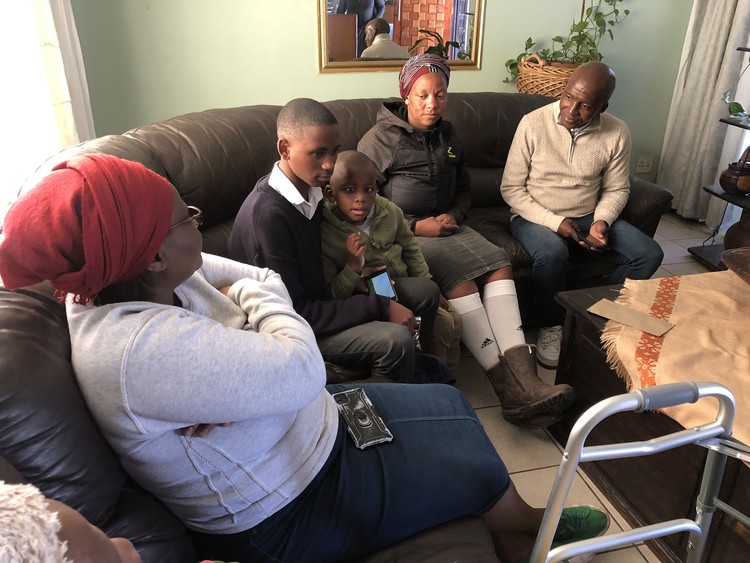
1 August 2024
Phumeza Hulushe and her 16-year-old son Linamandla (in school uniform), with Lwazi Mtalane and his mother Zandile Khonco, and Sibongiseni Faku of Freedom for the Forgotten. Photo: Mary-Anne Gontsana
A Khayelitsha mother says she’s desperate to find a place in a high school for her 16-year-old son who has been in primary school for 10 years now.
Phumeza Hulushe’s son Linamandla is currently in the last year at a primary school near their home in Site B. He has repeated each grade since grade 3. This is the second year Linamandla is in grade 7.
Linamandla’s situation is familiar to social workers and activists working with children with disabilities in townships. A social worker told GroundUp that they have been getting “endless requests” by parents desperate to find places for their children at special needs schools.
Hulushe says she has been back and forth to the offices of the Western Cape Department of Education (WCED) for years to find a school that can accommodate her son in Khayelitsha.
When GroundUp visited the family, Linamandla sat quietly on the couch next to his mother, wearing a white school shirt, a navy blue jersey and grey school pants and holding his school bag.
“I am worried about what my son is going to do next year,” his mother said. “We have been on a waiting list at a school of skills for the past four years. Every time I check in regarding progress, I am told that there is no space yet.”
Hulushe said she has been informed that her son will no longer be allowed to attend the primary school, and is worried he will be left at home alone and could be influenced by “troublemakers” in the streets. She said he is bullied by other learners for being the oldest in his class.
“This hurts us so much because it is also messing with his confidence. Sometimes he does not even want to go to school because of the bullying,” said Hulushe.
The family of Lwazi Mtalane, who will be seven this month and has been diagnosed with autism, is also struggling to get him into a special needs school.
“He has been attending creches and in most of them I have had to remove him because he is a problem,” said his mother, Zandile Khonco.
“If he goes to a proper school, he will be able to get the education he needs and they will also teach him how to handle himself in certain situations.”
According to the WCED, three schools in Khayelitsha cater for learners with special needs and disabilities: Khayelitsha Special School, Noluthando School for Deaf and Autism, and the Lathi-tha School of Skills. WCED spokesperson Bronagh Hammond said Linmandla is on the waiting list for Lathi-tha School of Skills and Lwazi is on the department’s autism spectrum disorder waiting list.
Sue Philpott, a researcher on disability and inclusion, is on the Ministerial Task Team set up in April last year to look at implementation of the Inclusive Education Policy. She says the team has just finished an analysis of the situation.
The two cases of the learners in Khayelitsha “are an illustration of how the system is still failing young disabled people in the country”, says Philpott.
The task team’s analysis didn’t look specifically at the issue of placement, she says, but children with disabilities, like all children, should be able to attend the school of their choice. “Based on its obligations under the Convention on the Rights of Persons with Disabilities, South Africa should be working to ensure that
every child is able to attend their local inclusive community school.”
“The focus should be on ensuring that every child gets the support that they need within their educational environment.”
Philpott says there has been a shift from taking learners out of their school to
get support, and rather bringing the support into schools.
The Inclusive Education Policy described three levels of support, she says:
“But this distinction has not really been helpful,” she says. Many special schools are not equipped with specialised teacher knowledge and resources, and the concept of full-service schools has not been as effective as expected.
“I think the question ‘where should we place a disabled learner?’ should be turned around to ‘how do we ensure that every learner gets the support that they need in their school of choice?’” says Philpott.
“There is a huge need to develop innovative ways of providing support in an inclusive education system.”
Nel Boshoff, a social worker at Shonaquip Social Enterprise, said they have been getting “endless requests” by parents desperate to find places for their children at special needs schools.
Shonaquip provides support services to families of children with disabilities including WhatsApp support groups in each province.
“The challenge is that children are only legally required to attend school until 15.”
In the past year the organisation had referred about 60 learners in Gauteng and about 20 in Western Cape with success, said Boshoff. They had “absolutely no success” in other provinces, she said.